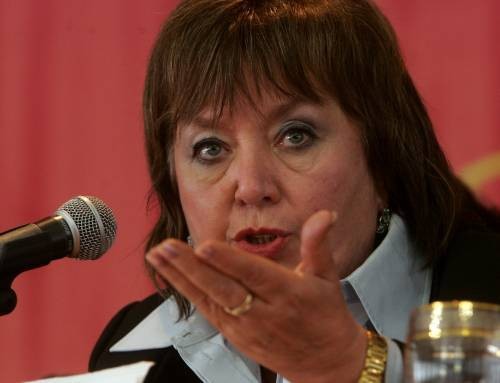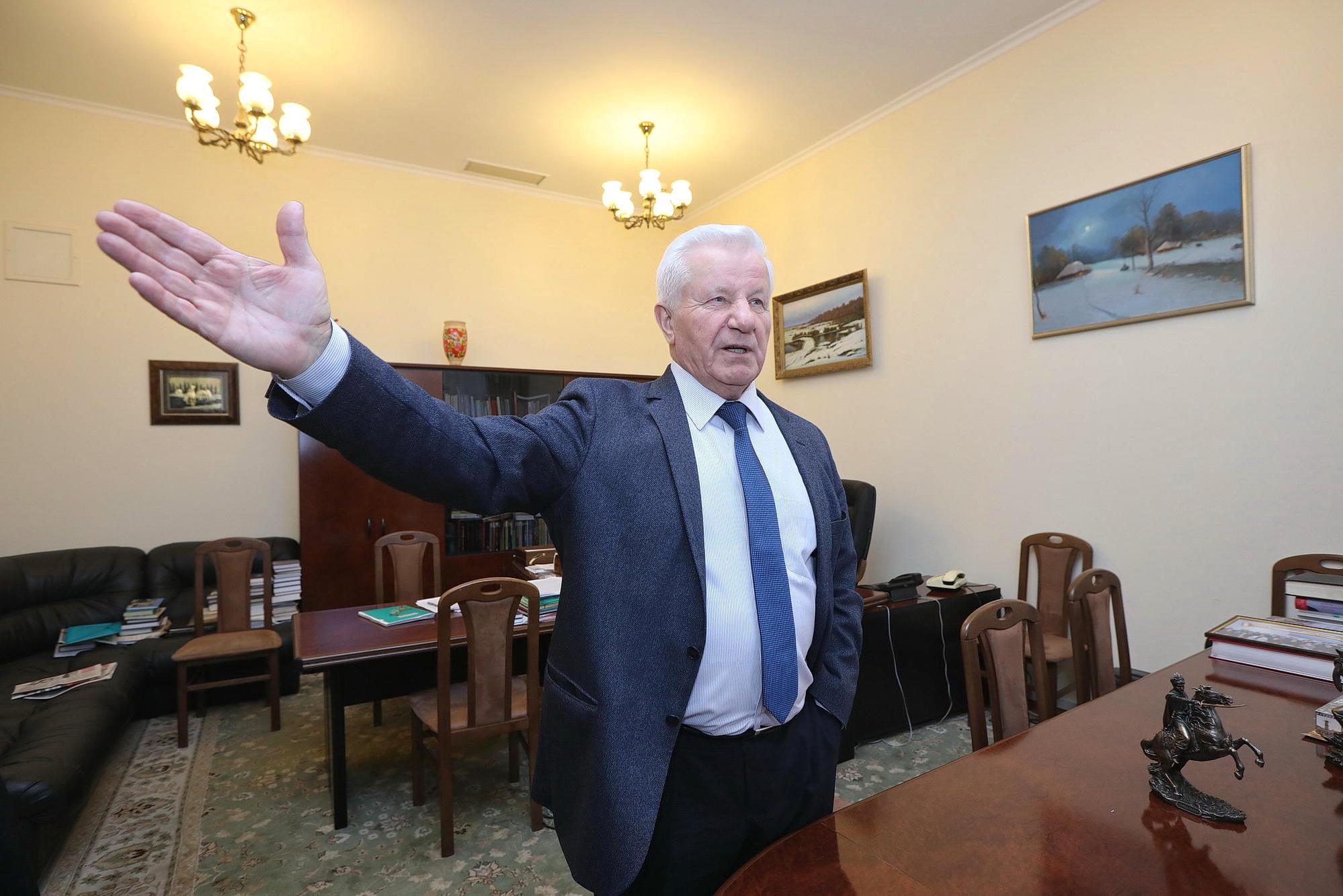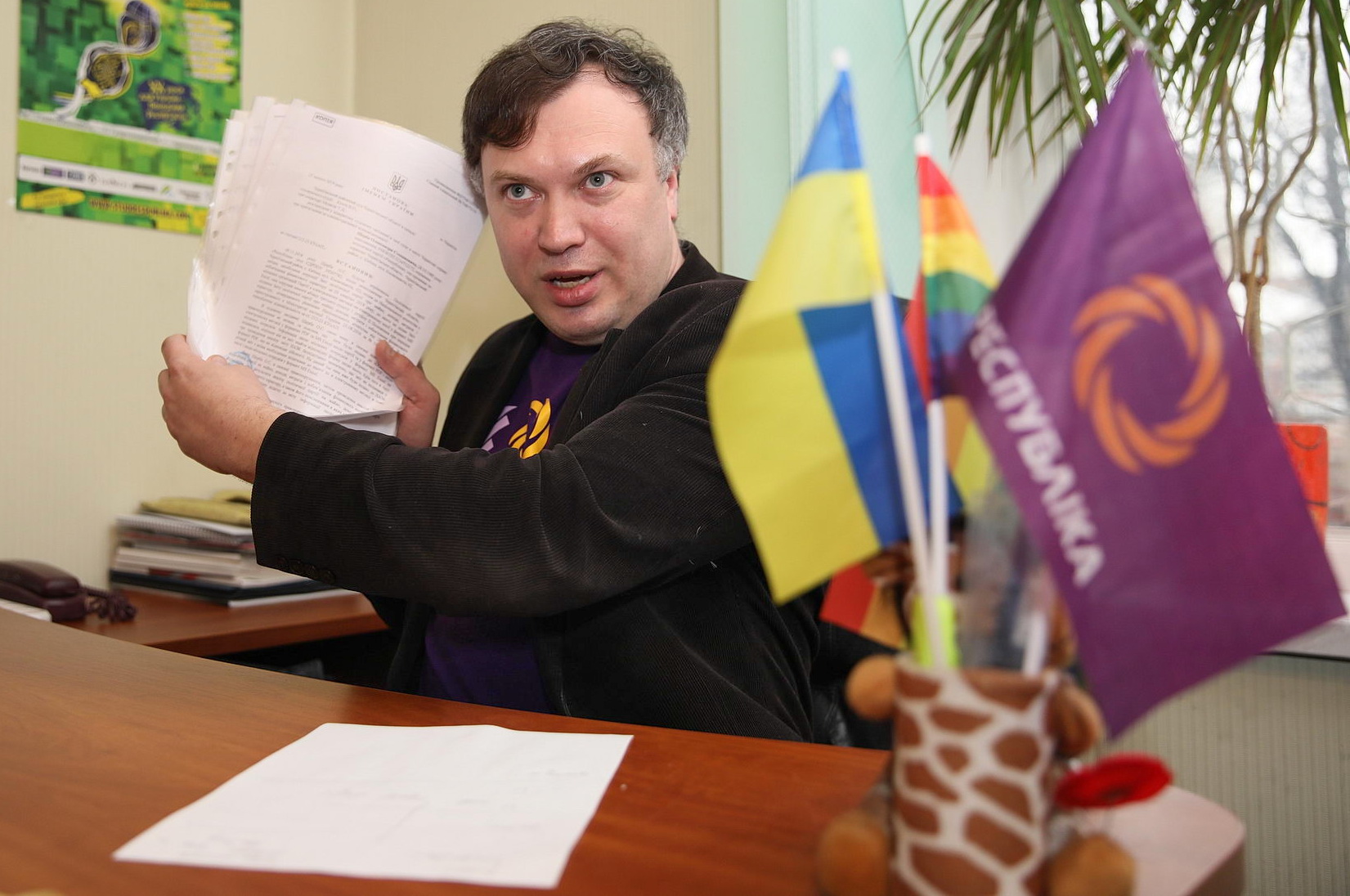Serhiy Kaplin is running for president, but he knows his chances of winning aren’t high.
Rather, the two-term lawmaker says he is running to offer Ukrainians an alternative to the current “triangle” of frontrunners: incumbent President Petro Poroshenko, former Prime Minister Yulia Tymoshenko, and the surprise favorite: comedian Volodymyr Zelenskiy.
He terms them, respectively, “he, she and it.”
Kaplin is a charismatic speaker known to deploy a humorous turn of phrase. But his campaign and political plans are dead serious, he says. The lawmaker advances a populist platform of helping ordinary Ukrainians.
And he’s also running as the leader of a new party. Despite last being elected to the Verkhovna Rada in 2014 for the Bloc of Petro Poroshenko, he is now the leader of the Social Democratic Party.
“Our job is to tear up this vicious triangle and offer an ideological, European, economically and historically sound alternative,” he says. “In my opinion, it’s the national idea known as social democracy.”
Kaplin adds: “I’m doing almost exactly the same as (Senator) Bernie Sanders or Alexandra in America.”
He means Alexandria Ocasio-Cortez, the 29-year-old democratic socialist firebrand recently elected from New York City to the U.S. House of Representatives.
In both the United States and Britain, socialism is gaining popularity among young people disaffected with the low wages, shrinking benefits and limited social mobility they see as inherent as in the capitalist system.
Millions of Ukrainians face more a extreme version of these problems in a country where the average monthly wage is just over $300. Socialism should presumably have a strong base here. But in Ukraine, socialist candidates – at the campaign’s peak, there were three running for president – remain distinctly unpopular in the 2019 presidential race.
Bogged down by Ukraine’s communist history and economic populism across the political spectrum, these politicians struggle to stand out, despite an ostensible demand for economic justice in Ukraine.
Burden of history
Despite their limited popularity today, left-wing candidates have long played a central role in Ukrainian politics. Both of the country’s first two presidents, Leonid Kravchuk and Leonid Kuchma, emerged from the Soviet Communist Party. And the Communist and Socialist parties made up a significant portion of the Verkhovna Rada in the 1990s and early 2000s.
During the country’s 1999 presidential election Kuchma faced a series of left-wing challengers – and his victory was far from guaranteed.
Several polls during the campaign showed that Kuchma’s three leftist competitors – Oleksandr Moroz of the Socialist Party, Petro Symonenko of the Communist Party, and Natalia Vitrenko of the Progressive Socialist Party – enjoyed a slight lead over the incumbent. Others showed Moroz as his strongest challenger.
Polling by the Democratic Initiatives Foundation even showed Vitrenko with a significant lead over Kuchma at several points during the campaign.
However, disunity also harmed left-wing candidates. Vitrenko, a Marxist-Leninist hardliner known for her pro-Russian views, had broken from Moroz’s Socialist Party over its more moderate stance on market reforms and cultural issues.

Natalia Vitrenko, a communist hardliner who led the pro-Russian Progressive Socialist Party, was one of four top contenders for the Ukrainian presidency in 1999. Today, she has largely exited politics.
In August 1999, Moroz would attempt to form a coalition with three smaller left-wing candidates in the town of Kaniv. Despite their promise to unite behind the strongest candidate, only one of the “Kaniv Four” exited the race.
There was also a significant amount of foul play. Some believed Kuchma was financing Vitrenko in an attempt to take votes away from Moroz, who had until recently been speaker of the Rada and was perceived as a strong candidate.
Most shockingly, Vitrenko and over 30 supporters were injured in a grenade attack on the candidate in October 1999. One of the key suspects was reportedly a low-level election employee of the Socialist Party. Pro-Kuchma media accused Moroz — who denied any involvement in the attack — of turning to terrorism.
Later, Kuchma’s former bodyguard would implicate the president in ordering the attack on Vitrenko and instructing the country’s SBU security agency to make one of the suspects testify against Moroz.

Petro Symonenko, leader of the Communist Party of Ukraine, competed against and lost to incumbent President Leonid Kuchma in the second round of the 1999 election. In 2015, Ukraine banned the Communist Party, effectively knocking Symonenko out of mainstream politics. (Courtesy)
Ultimately, support for Moroz in the 1999 election would disappoint. Kuchma would take first place, followed by Communist Symonenko, a pro-Russian, back-to-the-USSR candidate.
In the second round, Kuchma would handily defeat his opponent with 56.25 percent of the vote.
Mixed prospects
After the 1999 election, leftists continued to play a role in Ukrainian politics – albeit, a less significant one.
But the EuroMaidan Revolution, which drove pro-Russian President Viktor Yanukovych from power in February 2014, delivered a serious blow to these politicians. And Russia’s annexation of Crimea and invasion of Ukraine’s eastern Donbas would largely discredit pro-Russian politics.
In 2015, Ukraine banned the Communist Party, effectively knocking Symonenko out of mainstream politics. Meanwhile, the stridently pro-Russian Vitrenko is more known today for political commentary published on YouTube than for her actual participation in politics.
Still, social democracy and socialism remain popular ideologies in Ukraine to this day. According to a 2018 survey by the Friedrich Ebert Foundation, around 41 percent of Ukrainians relate positively to social democracy, while about 35 percent are positive about socialism.
However, the survey also found that many Ukrainians are not greatly informed about different political ideologies and struggle to identify their own.
Leftists today
Today’s left-wing candidates are further removed from the Soviet legacy. They say they want to build a social democratic and European Ukraine. But not all their positions are obvious steps in that direction.
Serhiy Kaplin says he wants Ukraine to have a strong president – something he views as necessary for the country’s rapid development – and calls for the elimination of the post of prime minister. That seemingly contradicts the lessons of the country’s two revolutions, as well as most expert opinion.
One of Kaplin’s biggest promises – the subject of the main campaign ad on his site – is to make natural gas four times cheaper for household consumers. He has driven this promise home by trolling Tymoshenko, who promises to cut gas prices in half, on social media. After a photo appeared online of Tymoshenko eating a hot dog, Kaplin posted a photo of himself with four hot dogs.

Lawmaker Serhiy Kaplin poses with four hot dogs in an attempt to troll former Prime Minister Yulia Tymoshenko. Previously, Tymoshenko had been photographed eating a hot dog. She promises to cut gas prices in half for household consumers. Meanwhile, Kaplin promises to lower them four times. (Facebook)
Kaplin has also promised to raise the minimum wage to Hr 10,000 (around $372) from the current Hr 4,173 ($155), to raise the minimum pension to Hr 5,000 ($186), and to create 5 million new jobs.
He cites his experiences in the politics of gas-producing Poltava Oblast, as a former entrepreneur, and as the deputy chair of the Rada’s committee on social policy as the source of his insight into these issues.
In Ukraine, workers’ salaries make up only around 8 percent of the cost of production. In Europe, it’s 30 to 60 percent, and in the United States it’s around 50 percent, Kaplin told the Kyiv Post.
“Over there, you’re a partner. Here, you’re a slave,” he says. “That absolutely does not suit me.”
Populist leftist
Kaplin is not the only socialist candidate running with such a message. Another is Illia Kyva, an Interior Ministry colonel and ex-advisor to Interior Minister Arsen Avakov.
A former member of the far-right Right Sector party, Kyva took formal control of the Socialist Party, a move that Kaplin tried to fight in court. In his official platform, Kyva proposes creating a unified database of citizens in order to provide social payments to people not earning enough to get by and raising the minimum pension to the official subsistence level. He also wants to end Ukraine’s cooperation with the International Monetary Fund.
His fiery rhetoric easily resembles that of both socialist and non-socialist populist candidates.
“The state is thinking up newer and newer means to destroy the nation: subsidies, miserly salaries and pensions. Debt collectors!” he said in a statement on his party’s website. “Criminality – this is (Ukraine’s) state power.”
However, Kyva has also attracted attention for sexism.
During an interview on the 112.ua television channel, Kyva said his former boss, ex-National Police Chief Khatia Dekanoidze, “was pretty, and that made an impression. But it was difficult for me to accept a female leader.”
He then attempted to justify his sexism, saying: “Jesus was sexist.”
The third and final socialist presidential candidate in 2019 was a familiar face – until he exited the race on March 27: Oleksandr Moroz, the two-time Rada speaker and founder of the Socialist Party. Now, however, he was representing the aptly named Socialist Party of Oleksandr Moroz. It was the veteran politician’s fifth presidential campaign. While he announced he was withdrawing his candidacy, it was too late to technically do it – so he will nevertheless appear on the ballot.
Moroz has undeniably played an important role in Ukrainian politics, for many years representing the country’s democratic left constituency. In 2000, he publicly accused Kuchma of involvement in the murder of journalist Georgy Gongadze based upon testimony of the president’s former bodyguard. And Moroz actively took part in the Orange Revolution against voter fraud in the 2004 presidential election.

Oleksandr Moroz speaks with the Kyiv Post in his office in the Verkhovna Rada committees building on March 13, 2019. (Kostyantyn Chernichkin)
However, he had largely been out of politics since 2007. He said he was running again because he believes the country is being intentionally destroyed.
In contrast to Kaplin, Moroz had a different plan: “the elimination of the office of the president in its current form,” he told the Kyiv Post.
He also wants to eliminate the state administration, which he said promoted corruption, and reform tax legislation to empower municipal government.
“According to the constitution, (the people) are the source of power, but this source only exists for a few minutes when they are voting.” Moroz told the Kyiv Post. “This shows us that the authorities are far from the people, not under their control, and do not meet the standards of the constitution.”
But there were also distinct issues with Moroz’s candidacy. The veteran politician is highly negative on the EuroMaidan Revolution, which he characterizes as simply a conflict between two different sets of political actors.
He also repeatedly asserted that Ukraine’s government is being “controlled from the outside” and that the election results will be determined by the “global government.”
Moroz may also be tainted by previous political associations. During a televised debate in which he took part, political scientist Oleksiy Haran both praised and criticized the politician.
“You truly did a lot for Ukrainian parliamentarianism. But in 2006 you sold yourself to Yanukovych for the position of (Rada) speaker…” Haran said. “(You) formed a coalition with Yanukovych and Symonenko, and, as a result, Yanukovych became the prime minister.”
New left?
Why is the Ukrainian left so weak today? In reality, the problems go beyond the discrediting of the Soviet model and several prominent leftist politicians’ pro-Russian orientations.
One of main reasons is that much of the post-1991 left actually is not truly left, says political scientist Mykhailo Minakov.
He believes the country has two right-wing political groups – one that is ethno-nationalist and the other that is neo-Soviet. The Communist Party and the Progressive Socialist Party were actually Soviet conservative, Minakov says.
Certain lines between left and right have also become blurred in Ukraine. Minakov notes that far-right parties are increasingly pushing traditionally leftist ideas like de-oligarchization and nationalizing parts of the economy.
“There is a demand for equality and social justice (in Ukraine). It’s huge and it’s part of the culture,” Minakov says. “But at the same time we are traumatized by the Soviet experience that does not transfer the demand into supply.”
But there is another left in the country, one that is progressive and European in its political orientation, Minakov says.
The Respublica Party operates out of a small apartment in an ordinary housing complex in central Kyiv. Unlike other socialist parties, it is not fielding a candidate in the presidential election. And it very clearly lacks both political and financial resources.
However, the young and youth-oriented party has a clear political ideology and big plans for the future.
Pavlo Viknyansky, who leads Respublica, has dreams of a democratic political coalition that includes everyone from workers and coal miners to the LGBT community.
For years, the party struggled to officially register, facing repeated rejections by the Justice Ministry, Viknyansky says. Only after EuroMaidan did it manage to formalize its status.
Viknyansky says the Ukrainian oligarchy is trying to discredit left-wing ideas, and the “pseudo-leftist” candidates running for president only help achieve that.

Pavlo Viknyansky, leader of the Respublica Party, displays legal documents as he recounts the party’s struggles to get registered and to participate in regional and local elections during an interview with the Kyiv Post on March 19, 2019 at the party’s central Kyiv office. (Volodymyr Petrov)
Moreover, Viknyansky believes that Ukraine’s just war against Russia is being used to strengthen rule by oligarchs and political groups under their control – and it is happening at the expense of the vast majority of Ukrainians, he says.
“We want to break this vicious cycle that turns us into a country on the periphery,” Viknyansky told the Kyiv Post. “Our path is one of progress, of the development of science, education, inclusive culture, the rights of absolutely all language, ethnic and religious groups…”
Respublica supports Ukraine’s integration and cooperation with Europe, and particularly the implementation of European standards within the country. However, it opposes the “dictates of European bureaucrats” – the phrasing in its official platform.
Viknyansky stresses that he wants Ukraine to become a link between the countries of the European Union and a future democratic Russia, which he distinguishes from the “crypto-fascist” Putin regime, he says.
Respublica’s views are far from mainstream – and it shows. In its small office, the party publishes an old-fashioned Ukrainian political newspaper, “New Republic.” It has a stable, but limited social media presence. It has run candidates for the mayor of three regional capitals, and in local elections across Ukraine, but has not had any success.
The party has also attracted criticism for its opposition to nationalism – which Viknyansky calls “flirtation with the archaic” – and openness to continued horizontal ties with the people of Russia, separate from the Russian government. Viknyansky says his party must constantly worry about whether its events will be attacked by far-right titushki, a term referring to hired political thugs.
But in one way, Respublica is like the other socialist parties: it is thinking big and looking to the future.
It aims to enter the October 2019 parliamentary election with a left-democratic front that “will be a real alternative to the regime” united by values, one that is ready “to take responsibility for the highest positions and seriously state offices, both in the center and locally.”
Kaplin takes a similar view. Asked about his party’s plans after the presidential election, he also didn’t hold back.
“We must offer the country – the elite and the people – a new social-political idea,” Kaplin said.
